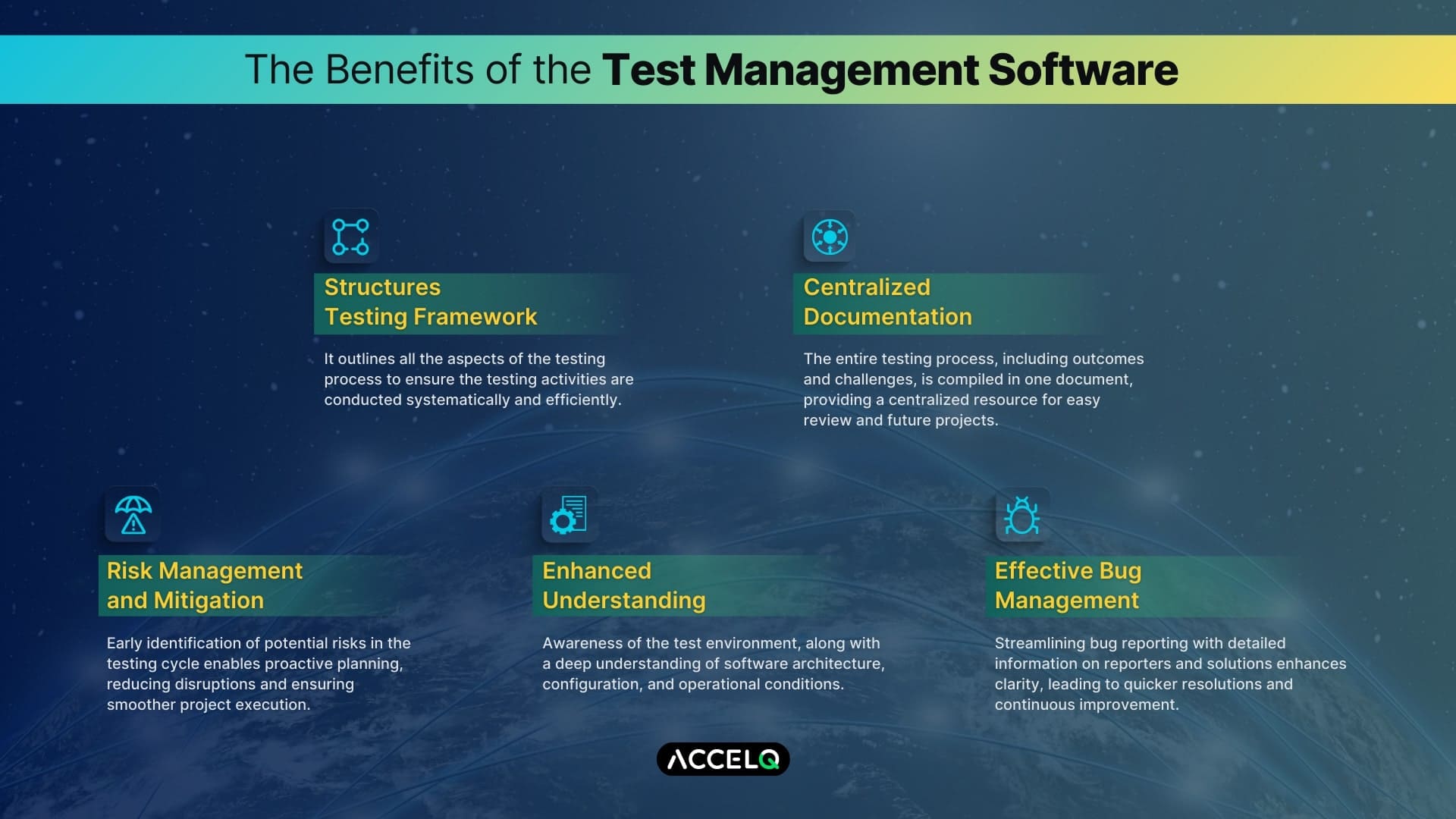Optimizing Test Management Process For Enhanced Testing

Software applications and products are becoming complex and more intertwined with growing technology. Many ongoing features must be tested without disturbing the existing error-free features. It seems a bit complicated to oversee the entire process and fix everything for software enhancement. Test management can help you handle all the testing activities without intervention and proper planning. The question is how? Let’s gain deeper insights into the test management process.
What is Test Management Process?
Test management is a systematic process that encloses the organization's control and monitoring of overall testing functions from beginning to end. The perfect test management tool accomplishes an effective testing strategy. These tools help maintain traceability and visibility throughout the software testing lifecycle, making it transparent and measurable.
With test case management process, testers can accurately forecast and analyze software test performance, optimizing resource allocation and ensuring the software testing process runs smoothly and meets all expected standards.
How to Perform Test Management Process?
The entire software test management process is divided into 2 major phases: test planning and execution. Each phase has tailored subtasks to enhance the overall efficiency of the testing strategy.
Test Planning
Test planning is the foundational phase where strategies and objectives are carefully documented. This is a comprehensive blueprint for the testing activities, outlining the tools, resources, schedules, estimations, and deadline requirements.
- Risk Analysis: This initial step identifies potential risks early in the testing cycle. It allows the test managers to avoid complex errors and minimize the project costs.
- Test Estimation: QA teams can obtain accurate test estimations to gauge the testing activities, projected timelines, and required resources, facilitating better planning and execution.
- Test Organization: It involves defining the roles and responsibilities within QA teams. It clearly shows task allocations, communication, and coordination among the team members.
Test Execution
Test execution is the active phase of implementing the test plan. Here, tests are conducted to verify whether the software meets all the predefined requirements.
Test Monitoring and Control
Continuous monitoring during this phase ensures that the project adheres to its schedule and budget. It provides QA engineers with real-time insights into testing activities, enabling them to make timely adjustments to the resources or schedules.
Issue Management
When risks materialize into problems, it ensures they are resolved efficiently and minimizes their impact on the project.
Test Evaluation Report
At the end of the test execution phase, a report needs to be generated with a detailed analysis of the testing process and its effectiveness. It includes testing metrics on test coverage and the satisfaction of exit criteria. This report gives a lead a complete overview of outcomes.
Benefits of Test Management
Software test management is pivotal in delivering error-free software that meets customer expectations. Here are a few more benefits an organization can get by learning deeper insights on what is test case management in software testing.
Structures Testing Framework
It outlines all the aspects of the testing process to ensure the testing activities are conducted systematically and efficiently.
Enhanced understanding
Being aware of the test environment with a deep understanding of software architecture, configuration, and operational conditions enables more accurate an relevant testing.
Centralized Documentation
Entire testing process with outcomes and hurdles is consolidated in one single document. It gives a centralized point where everything is easy to review and becomes a valuable resource for upcoming projects.
Effective Bug Management
Streamlining the bug reporting process with detailed information on who and how issues have been reported and solved clarifies many aspects. It leads to quick resolution and continuous improvement.
Risk Management and Mitigation
Identifying potential risks early in the testing cycle clears a path for proactive planning and strategy implementation. This minimizes disruptions and ensures smoother project execution.
Best Practices for Test Management Process
For enhanced quality of your products, it is important to meet the customer's expectations. Having a strategic, effective implementation of the test management process ensures it. Consider achieving it with the best practices below:
Early Risk Management
It is beneficial to initiate the risk analysis and management in the early stage of the software development cycle. Identifying and mitigating the potential software vulnerabilities allows rectification on time.
Automate Test Estimation
With automation, pitching test estimation accuracy significantly improves. It also facilitates resource allocation in project planning.
Low Code/ No Code Tools
These tools streamline the test case creation and easy navigation through complex testing scenarios. They enhance the speed and accuracy of the entire testing process, making it error-free and scalable.
Iterative Testing
The method of refining and improving testing assets saves time and also helps in building more effective testing strategies.
Team as One
Coordination among all the testing resources: developers, testers, and operation teams maximize productivity for achieving better ROI.
Conclusion
Organizations ensure comprehensive coverage and systematic testing in the software testing lifecycle. But with test management's help, they can handle the underlying challenges to increase testing efficacy overall. ACCELQ can give companies a competitive edge by providing the required test management process to govern their testing process for customer satisfaction. Connect with our team today for a comprehensive demo to understand what we offer in a more clear possible way.
Discover More
 ACCELQ® API Regression Automation
ACCELQ® API Regression Automation
ACCELQ® API Regression Automation
 Acceptance Test Driven Development: A Comprehensive Guide
Acceptance Test Driven Development: A Comprehensive Guide

































